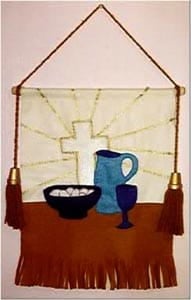 Catechesis is to Catholics like the economy is to politicians. Everybody bitches about it, everyone blames a favorite villain, everyone carries a theory about how to make it better, and, in the end, nothing seems to get better.
Catechesis is to Catholics like the economy is to politicians. Everybody bitches about it, everyone blames a favorite villain, everyone carries a theory about how to make it better, and, in the end, nothing seems to get better.
In this interminable squabble, there are two basic positions (and here, I am aware that I generalize). Catholics of a more conservative temper tend to blame a general frivolity and lack of substance. For them, modern catechesis is not much more than a batting practice of feeling-sharing, where soft-pitch questions are underhandedly tossed and aimlessly hit back without a care in the world as to where they land, foul or otherwise.
The other group, Catholics of more liberal tendencies, attribute our collective religious imbecility to religious education programs focused too heavily on rules and rote memorization which, in their minds, valuable as they are, failed to give sufficient scope to personal wrestling and to the foundational message of God's love.
I sympathize with both positions and with those who fall at all stages in between. I've had my theories, my villains, and my non-solution solutions. My experience as a teacher, however, has given me fresh thoughts; and two weeks ago, I tiptoed into the shallow end of this discussion by wondering whether Catholic instruction in all venues addresses students in areas of inquiry most responsive to their needs. Does it make sense, I asked, to spend time on scripture when young people might better be served by working through arguments for the existence of God? Should teachers worry about Jesus if our students come to class convinced that Darwinism has ruled out a Creator? Are teachers, in other words, jumping ahead and skipping the prerequisite?
The column provoked thoughtful emails and comments, many expressing exasperation, others, the old polarities, and some, simple gratitude at the chance to vent about a vexing issue. Without pretending to solve the matter, I want to add a few more observations that I hope will advance the discussion. What follows is, to be sure, by no means exhaustive.
It starts in the home. The Second Vatican Council's Declaration on Christian Education stated that since "parents have given children their life, they are bound by the most serious obligation to educate their offspring and therefore must be recognized as the primary and principal educators." The wisdom of the Council is confirmed by experience. A strong faith life in the home is the best indicator for whether a student will take catechesis and evangelization seriously.
While this factor does not guarantee a saint or a pope (or a Eucharistic minister, for that matter), it does make a student far more receptive to additional faith formation and less shocked at some of Catholicism's more strange-sounding claims. A family that regularly attends Mass and Confession, that prays together and treats other rituals of the faith as indispensable to life, is the best catechesis possible. For this, there is no substitute.
Unfortunately, catechesis rarely does start in the home. One of the biggest transformations in Catholic culture in the last forty or so years is that parish and high school religious instruction is no longer supplementary to what takes place in the home; rather, in most cases, it is the child's primary and sometimes sole encounter with the content of the faith. Anyone looking to impart Catholicism to anyone younger than forty must let that transformation inform their curriculum and expectations.
It takes a village. Ideally, catechesis starts in the home, but it should not end there. To borrow from Hillary Clinton, it takes a village. A life of faith that lasts into adulthood - one that evolves from compulsory to voluntary—is more likely when the immediate family is not the only place a child hears a Hail Mary or a mention of Mass. Day and night, powerful forces work to erode religious belief.
This does not mean Catholics should segregate themselves or shield their children from anyone who can't name a holy day of obligation. Exclusion and ostracization have no place. However, it does mean that Catholic parents should be mindful of the opportunities to place their children where the family's faith will be reinforced—or, at the least, not undermined. On this point, I am reminded of Kenneth Woodward's outstanding essay in the April 2011 edition of First Things. Recalling his Ohio Catholic boyhood, Woodward wrote:




